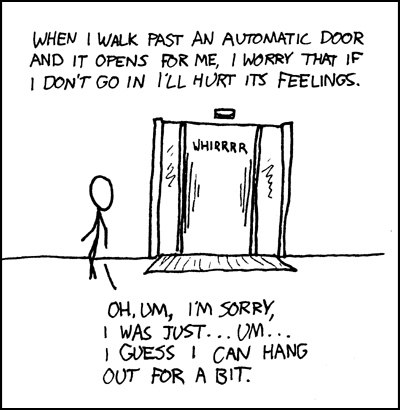Powerpoint is my crutch. As a teacher I have long been dependent upon powerpoint*. But I have also been concerned about the way in which it forms the way I teach and the way in which students learn. Increasingly students have an expectation of getting the lecturerâ??s powerpoint slides â?? Preferably in digital form and in advance of the lecture.
Powerpoint Students
What is a lecture? University is filled with them. They are praised by some and reviled by others (this will be the topic for a future post). To the student the lecture almost defines university life. Therefore it is maybe not all good when the lecture has become confined to the square space and bullet point list defined by presentation software.
Most often I do not hand out my handouts, nor do I provide my powerpoint slides in digital or any other form to my students. This is not an attempt to monopolize or capitalize on my knowledge. To understand the purpose of this we must look at the purpose of powerpoint slides.
Slides are used (in my teaching) for two purposes. First, and foremost, the slides are there to keep me on track to help me keep my thoughts in order. Second, the slides are intended to underscore certain more important thoughts or concepts. Thirdly, the slides may provide light entertainment they can help the listeners to keep listening.
As these points show, the slides are not a replacement for the lecture, lecturer, or literature. So in order to make sure that this message gets across: I do not hand out my handouts.
Powerpoint Lecturers
If the student has become used to being fed with powerpoint slides then what about the lecturer. We have (generalization warning!) become dependent upon powerpoint. Planning a lecture begins with the opening of presentation software. The knowledge we want to transfer is confined by our ability to condense it (knowledge) into squares and lists.
By adding features, such as effects, sounds and images we believe that we are somehow helping the students to understand what we have learned through reading, scientific method and experience.
Handicap Warning
Powerpoint can be, for both students and lecturers, an invaluable support. But letâ??s not forget that the same software can be used as a way in which to hide the fact that no transfer of knowledge is taking place. Each student should as him/herself what they hope to see in the handouts and why they are so eager to obtain the handouts â?? at the same time so disinterested in the original.
Lecturers should stop and think before resorting to powerpoint. If powerpoint is necessary then they should stop and think about the content and its presentation. Would the students be equally served by the applying the old adage â??less is moreâ?? to powerpoint?

Did Einstein hand out handouts?
—
* the term powerpoint is intented to refer to a generic set of presentation software. The same results are obtained by Open Office presenter, Macâ??s Keynote, or any other such program.
Humor: The Gettysburg Powerpoint Presentation: Gettysburg Address as a powerpoint presentation http://norvig.com/Gettysburg/index.htm
Recommend Reading
Allan M. Jones. The use and abuse of PowerPoint in Teaching and Learning in the Life Sciences: A Personal Overview, BEE-j Volume 2: November 2003 http://bio.ltsn.ac.uk/journal/vol2/beej-2-3.pdf
David B. Daniel. Using Powerpoint to Ruin a Perfectly Good Lecture. Presented to the 1st Biennial SRCD Teaching of Developmental Science Institute 2005. http://www.srcd.org/biennial_archives/atlanta_2005/documents/daniel.pdf
Greg Jaffe. â??Pentagon cracks down on … PowerPointâ??, The Wall Street Journal Online. http://news.zdnet.com/2100-9595_22-502314.html
Jens E. Kjeldsen. â??The Rhetoric of PowerPointâ??, Seminar.net – International journal of media, technology and lifelong learning Vol. 2 â?? Issue 1 â?? 2006. http://www.seminar.net/volume2-issue1-2006/the-rhetoric-of-powerpoint
Jeffrey R. Young. â??When Good Technology Means Bad Teaching: Giving professors gadgets without training can do more harm than good in the classroomâ??, The Chronicle of Higher Education, Vol. 51, Issue 12, November 12, 2004. http://chronicle.com/free/v51/i12/12a03101.htm


